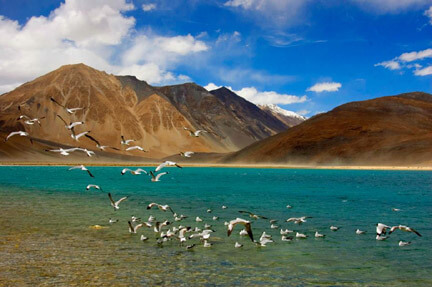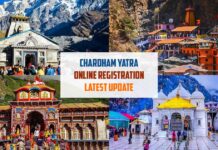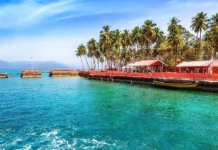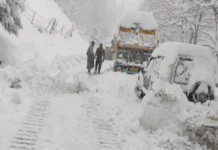 Land of Lamas amid picturesque Himalayas
Land of Lamas amid picturesque Himalayas
Embodiment of natural beauty, Leh, picturesquely nestled by Karakoram and Himalayan ranges, is the headquarters of Leh District in Jammu and Kashmir. Perfectly located on the banks of the renowned Indus River with all its majesty and amazing sceneries, Leh valley attracts tourists from all over the world to its lap all through the year. The major part of the Leh city is covered by ancient Buddhist monuments, mosques dating back to 16th and 17th centuries and a nine storied palace Sengge Namgyal constructed in Tibetan architectural style.
Leh is the land of Lamas, the Buddhist monks and is mainly populated by Buddhists and Hindus. Leh houses numerous Buddhist monuments, monasteries and study centers; Shanti Stupa and Sankar Gompa are some of them.
Leh has grown to be a trade centre in Central Asia, with many trading opportunities for the motivated and dedicated young traders and achievers. Shopping is an experience in Leh. One can spot many traders in the city selling spectacular Tibetan motifs and jewellery, winter woolen clothes and decorated world famous carpets.
Visiting Leh-Ladakh with kids
Mesmerizing Leh can be inhospitable for kids and tourists should be wary of all the conditions that they need to take care of before planning a trip with kids. It is advisable for tourists to not take children below the age of 5 years, as they may face acclimatization issues.
For tourists, the best route is Manali-Leh as it takes lesser time and allows tourists to enjoy some of the most mesmerizing sceneries on their Kashmir tour packages.
Leh & Ladakh – Precautions and Measures
For tourists traveling directly by air to Leh, acclimatization to the high altitude may take time, around 48 hours, for even adults. To counter, please drink as well as carry plenty of water. It is advisable to carry Diomax and Disprin as a backup.
Alcohol and tobacco should be completely avoided, as the low level of oxygen makes it very difficult to come out of a hangover and you don’t want to lose the sightseeing time, sitting in a hotel. Alcohol and coffee should also be avoided if you are in Leh on a trekking expedition. Tea, which is available in plenty, can be consumed.
Breathlessness due to low level of oxygen is common, so one should carry energy bars to keep boosting the system. Power cuts are very frequent in Leh and Ladakh and tourists are advised to good stock of batteries.
Carry your own water bottles and make sure that you use only double boiled water for drinking. Mineral water too is not sold to avoid the menace of plastic garbage. Many shops sell double boiled water. Don’t miss carrying a sanitizer as hygiene can be a concern in Leh and Ladakh.
Plastic is banned in Leh and Ladakh, so instead use biodegradable bags. Take permission before taking a photograph of any local.
During trekking do not litter the area and while touring a national park, make sure that you do not disturb the animals.
Feasting of the eyes is assured with the imposing pristine beauty of the snow capped Himalayan ranges in the backdrop. Tourists throng this place during the month of August when the annual tourist festival is conducted. Adventurous tourists are invited to take up trekking in the challenging undulated Himalayan terrains.
Many tourist attractions are nearby, Jama Masjid – the ancient historical mosque built during the Mughal Dynasty and the summer palace Shey of Ladakhi kings with a massive Buddha statue are among them. This is a place not to be missed by any traveling enthusiast.
Tourist attractions
General Zorawar’s Fort: General Zorawar’s Fort or commonly known as Riasi Fort, is an ancient fort known for preserving the private wealth of the Dogra rulers of Jammu. This age old ancient monument, presently in ruins, stands above the Leh Palace and the Namgyal Tsemo Gompa.
Hall of Fame: This glorious museum is located on the Spituk-Kargil road, approximately 4 km from Leh city. It was built in memory of the brave soldiers who lost their lives in Indo-Pakistan war. Maintained by the Indian Army, the museum showcases seized arms and amenities of Pakistani Army, pictures and biographies of brave soldiers.
Leh Palace: Leh Palace, an imposing and captivating marvelous structure, rises from the edge of a hill overlooking the Leh town, the well-known capital of Ladakh, and stretches out towards the indigo sky. Built in 17th century, this nine-storey monument was a residential place for the King Singge Namgyal.
Shanti Stupa: Shanti Stupa, literally means peace (Shanti) pillar (Stupa) established by a ‘Peace Sect’ of Japanese Buddhists, is situated above Changspa in Leh District of Jammu and Kashmir. It can be easily reached from Fort road. The Stupa was opened in 1985 by Dalai Lama with the intention of spreading Buddhist ideology. This is a place which tells the world the need for peace and harmony among its population.
Stok Palace: A short distance across the Indus River, near Leh (14 km) stands the Stok Palace, a major tourist attraction in Leh. Built in 1825 AD by King Tsespal Tondup Namgyal, it is a striking palace where the ancient and modern architectures meet making it a beautiful home. The palace is reachable by jeeps or through shared taxis.
Karma Dupgyud Choeling Monastery: Situated about 9 km from Leh, is one of the Dharma centers Karma Dupgyud Choeling Monastery. This world known Buddhist Monastery is run by the Karmapa sect of Tibetan Buddhists. Karmapa stands for “the embodiment of all the activities of the Buddha” or “the one who carries out Buddha-activity”. There are seventeen Karmapas as of today.
Matho Monastery: Matho Monastery, with the history of five hundred years and the only monastery under the Saskya monastic Establishment in Leh, is located 26 km from the city on the beautiful Indus River valley. Believed to be established by Lama Dugpa Dorje, a famous Lama in Buddhist monarchy, the monastery houses marvelous collection of ancient thankas, especially some in the form of mandalas.
Pathar Sahib Gurdwara: Set on the Leh-Kargil road, around 23 km from Leh, Pathar Sahib Gurdwara invites many tourists and pilgrims. Built in 1517, it serves as evidence of Guru Nanak’s visit to Ladakh. According to legend, a meditating Guru Nanak was attacked by a wicked demon by pushing a huge boulder from the hilltop.
Sankar Gompa: Located just 3 km from Leh city is the eye-catching monastery Sankar Gompa. Known for its excellent architecture, the Gompa houses an impressive representation of Avalokitesvara complete with 1000 arms and 1000 heads.
Adventure
Mountain Biking: Leh is a preferred destination for mountain biking offering daring mountain bikers the second highest motorable road in the world. The adventure in mountain biking from Leh lies in the most hostile terrains.
The entire road of about 485 km between Leh and Manali gives an opportunity to the challenging mountain bikers to cut across the majestic Himalayan ranges through four mountains passes. For daring mountain bikers Leh-Manali highway is spectacular road while enjoying the picturesque landscapes.
Trekking: Leh, a paradise for trekkers, is attracted by many nature lovers and adventurous tourists. The snow covered Himalayan trekking terrains poses mild to very tough challenges to trekkers. The experienced trekkers get the chances of highly challenging and breathtaking trekking trails in mountain ranges surrounding Leh.
Best time to visit
Leh is one among the two districts of Ladakh. The weather is extremely cold and harsh during winters, thus causing frost bites. The best time to visit Leh is from June to September.
How to reach
By Train: Jammu is the nearest railway station, which is about 734 km from Leh. Since Leh does not have railway station, train travel is not possible. Tourists will either have to take a bus or hire a cab both of which will take approximately two days to reach Leh. Tourists can also hire a bus from Manali (453 km). However, the Manali-Leh road is open only from mid-June to mid-October, due to weather conditions.
By Air: Different airline services provide regular services from Leh to Delhi and Srinagar and the tickets are moderately priced. Jet Airways operate 6 flights a week from Delhi and 1 flight in a week from Srinagar. Major cities in and abroad can be reached through Delhi.
By Bus: JKSRTC provide service from Srinagar to Leh (700 km) which takes two days and HRTC provide service from Manali to Leh (474 km), which takes about 20 hours or two days if you halt in between. Jeep services are also available.






